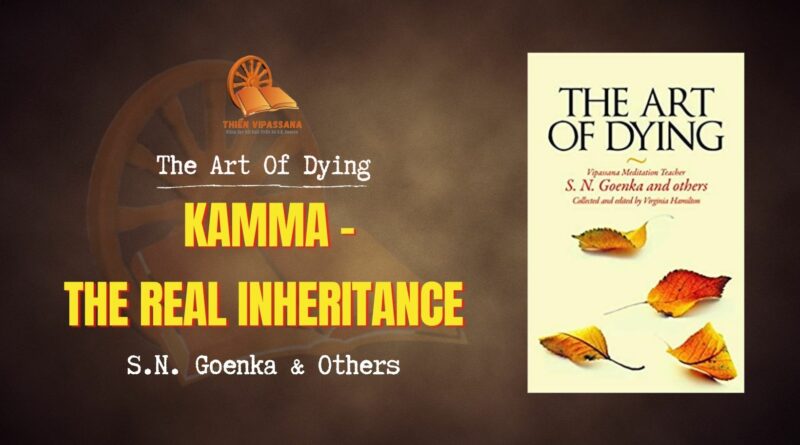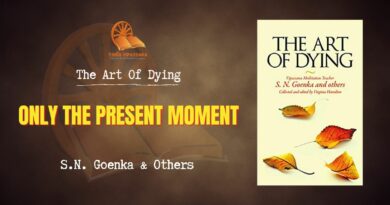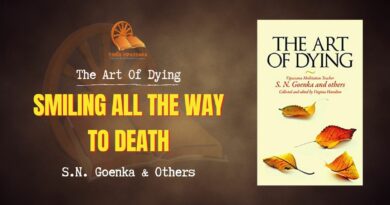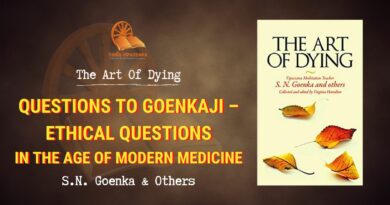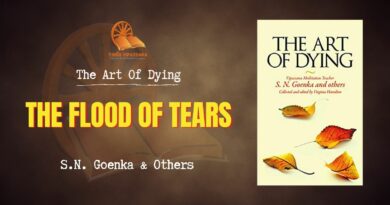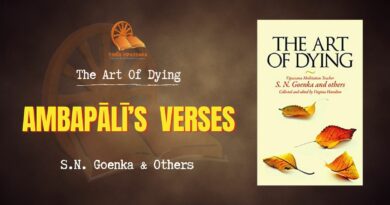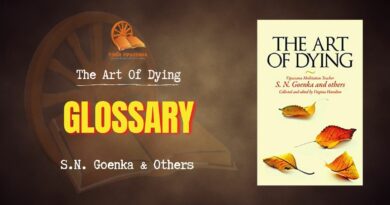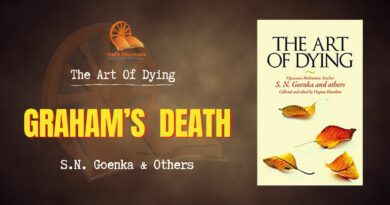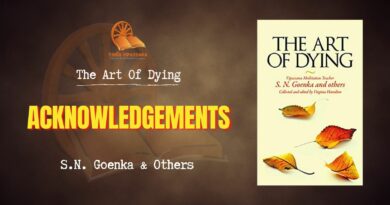Kamma – the Real Inheritance
Experiential wisdom that comes from meditation practice confirms that we alone are solely responsible for who and what we are. We cannot escape this law of nature. This understanding strengthens our desire to practice and serve Dhamma. It has a strong driving power that supports us in the dark moments of meditation or at times when we are tired and the mundane world seems to be winning us over.
As plants from sprouted seeds eventually bear more such seeds in future, in our daily lives momentary thoughts, words, and deeds sooner or later give their results accordingly. That future might be bright or dark. If in the present we make right efforts toward wholesomeness, awareness, and equanimity, the future becomes brighter. If through ignorance we react with craving and aversion, the future will be fraught with darkness.
The teachings of the Buddha show us how to develop the awareness of anicca and the habit pattern of equanimity in the face of both pleasant and unpleasant sensations. Knowing that this and only this is what dissolves the old habit patterns that make life so hard for us and for those around us is a supreme wisdom. This is what draws us out of misery and towards nibbāna. This is why we practice. If in the present we are watchful, prudent and diligent, we can bring to our futures a profound change for the better.
During the final discourse given in all long Vipassana courses, Goenkaji elaborates on the following exhortation of the Buddha. This article, excerpted from that discourse, was published in the June 1995 Vipassana Newsletter.
Kammassakā, bhikkhave,
sattā kammadāyādā kammayonī
kammabandhū kammapaṭisaraṇā.
yaṃ kammaṃ karonti—kalyāṇaṃ vā pāpakaṃ
vā— tassa dāyādā bhāvanti.
O meditators, beings are the owners of their deeds,
the heirs of their deeds, born of their deeds,
kin to their deeds; their deeds are their refuge.
Whatever actions they perform, whether good or evil, such will be their inheritance.
—Aṅguttara Nikāya 10.216
Kammassakā: O meditators, beings are the owners of their deeds.
The law of paṭicca samuppāda (dependent origination) is the universal law of cause and effect: As the action is, so the result will be. Mental volition is the driving force for action, vocal or physical. If this driving force is unwholesome, the vocal and physical actions will be unwholesome; if the seeds are unwholesome, then the fruits are bound to be unwholesome. But if this driving force is wholesome, then the results of the actions are bound to be wholesome. For a Vipassana student who develops the ability to observe this law at the level of direct experience, the answer to the question “Who am I?” becomes clear. You are nothing but the sum total of your kamma, your saṅkhāras. All your accumulated actions together equal “I” at the conventional level.
Kamma dāyādā: heirs of their deeds.
In the worldly, conventional sense one says, “I received this inheritance from my mother or my father or my elders,” and yes, at the apparent level this is true. But what is one’s real inheritance? Kamma dāyādā. One inherits one’s own kamma, the results, the fruits of one’s own kamma. Whatever you are now, the present reality of this mind-matter structure is nothing but the result, the sum total, of your own accumulated past kamma. The experience of the present moment is the sum total of all that is acquired, inherited—kamma dāyādā.
Kammayonī: born of their deeds.
One says, “I am the product of a womb; I have come out of the womb of my mother”—but this is only apparent truth. Actually, your birth is because of your past kamma. You come from the womb of your own kamma. As you start understanding Dhamma in a deeper and more experiential manner, you realize this. This is kammayonī, the womb that every moment produces the fruit of accumulated kamma.
Kammabandhū: kin to their deeds.
No one else is your relative—not your father, your mother, your brother, nor your sister. In the worldly way we say, “This is my brother, my relative, or my near or dear one; they are so close to me.” Actually, no one is close to you; no one can accompany you or help you when the time comes. When you die, nothing accompanies you but your kamma. Those whom you call your relatives remain here, but your kamma continues to follow you from one life to another. You are not in possession of anything but your own kamma. It is your only kin and companion.
Kamma paṭisaraṅā: their deeds are their refuge
Refuge is only in one’s own kamma. Wholesome kamma provides a refuge; unwholesome kamma produces more suffering. No other being can give you refuge. When you say “Buddhaṃ saraṅaṃ gacchāmi” (I take refuge in the Buddha), you understand fully well that a person by the name of Gotama, who became the Buddha, cannot give you refuge. Your own kamma gives you refuge. Nobody can protect you, not even a buddha. Refuge in the Buddha is refuge in the quality of the Buddha: the enlightenment, the teaching that he gave. By following the teaching, you can develop enlightenment within you. And the enlightenment that you develop within you, that is your wholesome kamma. This alone will give you refuge; this alone will give you protection.
Yaṃ kammaṃ karonti—kalyāṇam vā pāpakaṃ vā tassa— dāyādā bhāvanti: whatever actions they perform, whether good or evil, such will be their inheritance.
This should become clear to one who is on the path. This law of nature should become very clear. Then you will become inspired to take responsibility for your own kamma. Remain alert and on guard each moment so that every action, physical or mental, is wholesome. You will not be perfect, but keep trying. You may fall down, but see how quickly you can get up. With renewed determination, renewed inspiration, and renewed courage, get up and try again. This is how you become strong in Dhamma.
—S.N. Goenka
Na santi puttā tāṇāya,
na pitā nāpi bandhavā;
antakenādhipannassa,
natthi ñātīsu tāṇatā.
Etamatthavasaṃ ñatvā,
paṇḍito sīlasaṃvuto
nibbānagamanaṃ maggaṃ,
khippameva visodhaye.
Sons are no protection, neither father nor kinsfolk; when assailed by death, there’s no protection among kin.
Perceiving thus, the wise and self-restrained quickly clear the path that leads to nibbāna.
—Dhammapada 20.288-289
Atītaṃ nānvāgameyya, nappaṭikaṅkhe anāgataṃ;
yadatītaṃ pahīnaṃ taṃ, appattañca anāgataṃ.
Paccuppannañca yo dhammaṃ, tattha tattha vipassati; asaṃhīraṃ asaṃkuppaṃ, taṃ vidvāmanubrūhaye.
Ajjeva kiccamātappaṃ ko jaññā maraṇaṃ suve;
Na hi no saṅgaraṃ tena mahāsenena maccunā.
Evaṃ vihāriṃ ātāpiṃ, ahorattamatanditaṃ;
taṃ ve bhaddekaratto’ti
santo ācikkhate muni.
One should not linger on the past nor yearn for what is yet to come. The past is left behind, the future out of reach. But in the present he observes with insight each phenomenon, immovable, unshakable. Let the wise practice this.
Today, strive at the task. Tomorrow death may come—who knows?
We can have no truce with death and his mighty horde. Thus practicing ardently, tireless by day and night; for such a person, even one night is auspicious, says the Tranquil Sage.
— Bhaddekarattasuttaṃ, Majjhimanikāya, Uparipaṇṇāsapāḷi, Vibhaṅgavaggo
Bài viết này được trích từ cuốn sách The Art of Dying – Thiền Sư S.N.Goenka và nhiều tác giả khác.

